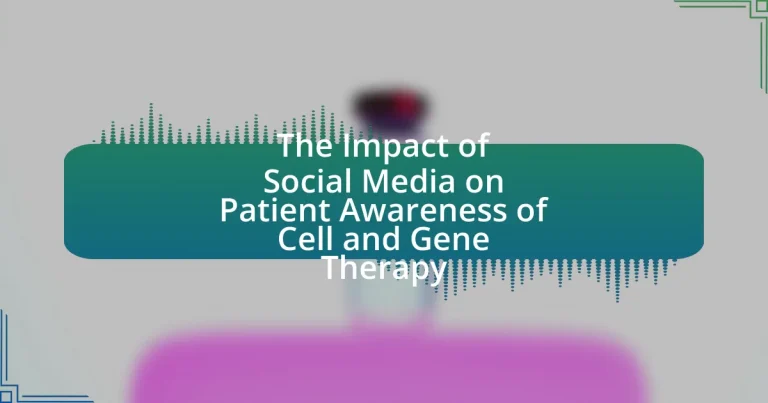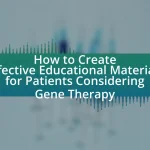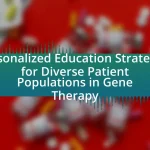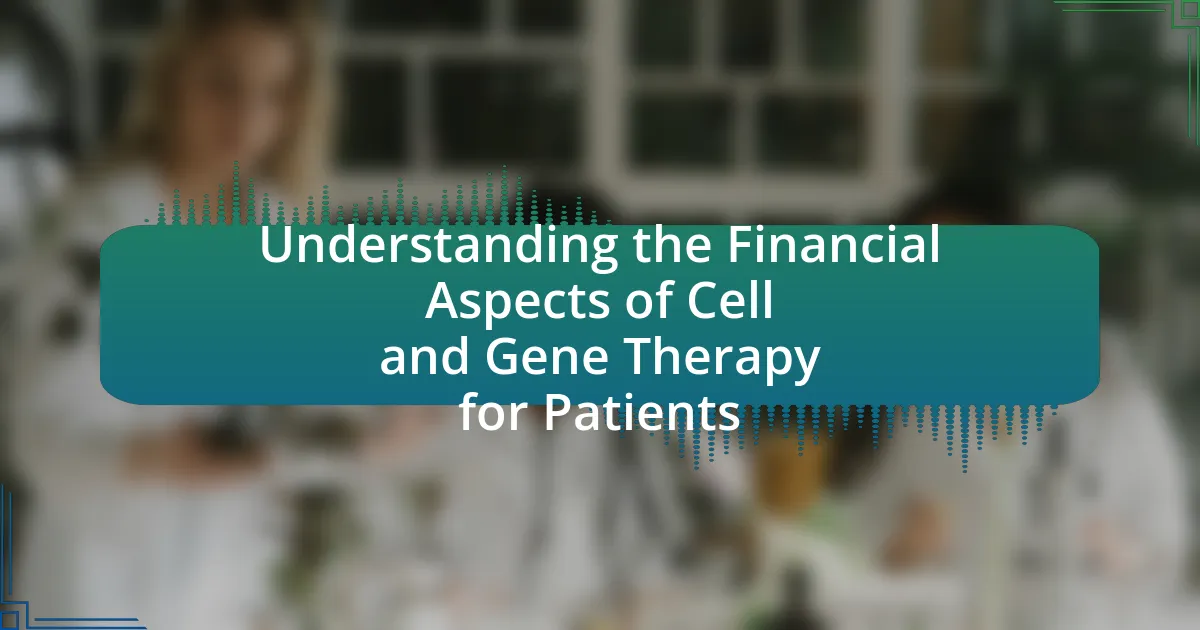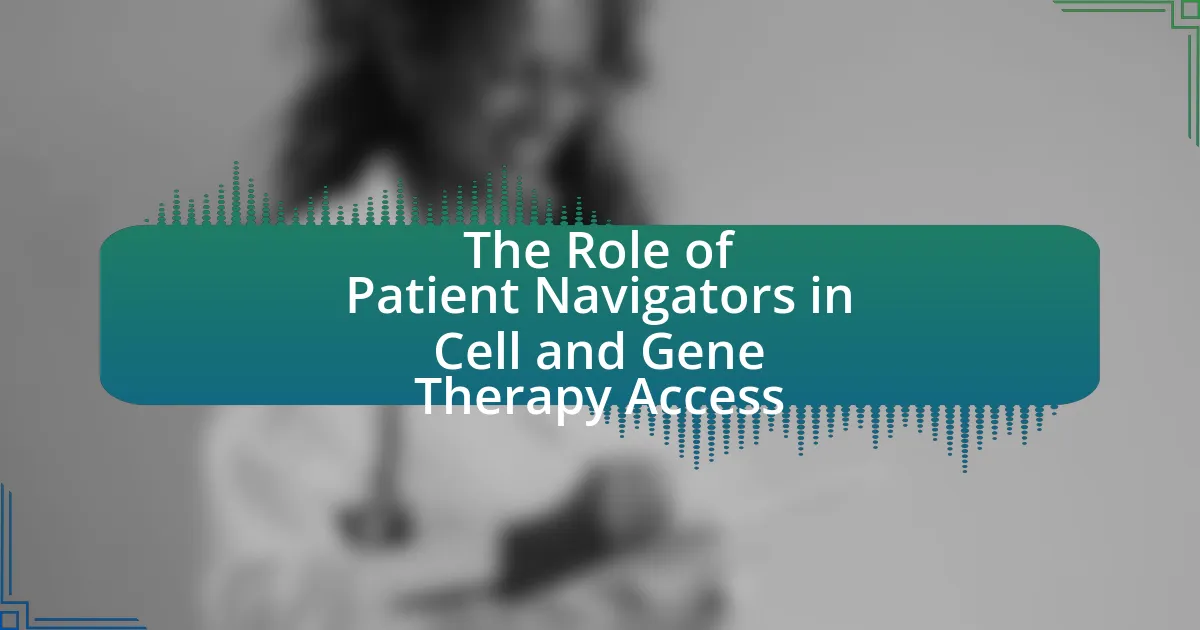The article examines the impact of social media on patient awareness of cell and gene therapy, highlighting its role in disseminating information and fostering community engagement. It discusses how platforms like Facebook, Twitter, and Instagram facilitate access to educational content, personal experiences, and clinical trial updates, significantly influencing patient perceptions and treatment decisions. The article also addresses the challenges patients face, such as misinformation and information overload, while outlining strategies for verifying information and enhancing awareness through targeted campaigns and influencer engagement. Additionally, it emphasizes the importance of patient awareness in improving health outcomes and the ethical considerations surrounding social media use in healthcare communication.
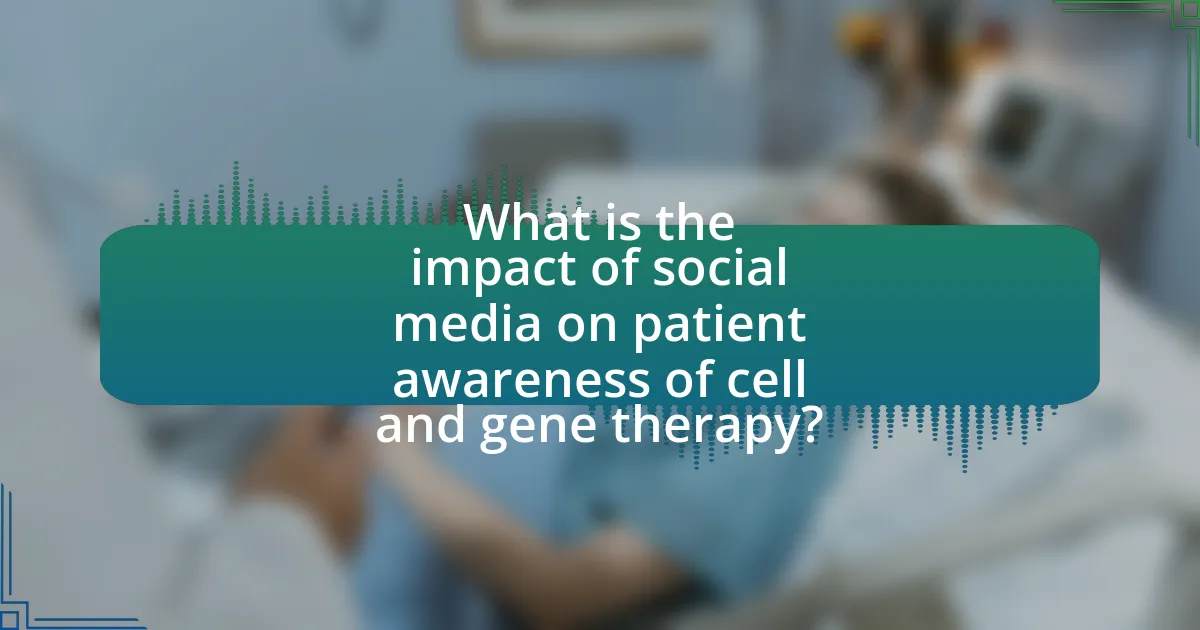
What is the impact of social media on patient awareness of cell and gene therapy?
Social media significantly enhances patient awareness of cell and gene therapy by providing accessible information and fostering community engagement. Platforms like Facebook, Twitter, and Instagram facilitate the dissemination of educational content, allowing patients to learn about treatment options, clinical trials, and patient experiences. Research indicates that 72% of patients use social media to seek health information, which underscores its role in increasing awareness and understanding of complex therapies like cell and gene therapy. Additionally, social media enables patients to connect with others facing similar health challenges, creating support networks that further amplify awareness and knowledge sharing.
How does social media influence patient perceptions of cell and gene therapy?
Social media significantly influences patient perceptions of cell and gene therapy by shaping their understanding and attitudes towards these treatments. Platforms like Facebook, Twitter, and Instagram facilitate the dissemination of information, allowing patients to access personal stories, expert opinions, and clinical trial updates. Research indicates that 72% of patients use social media to gather health information, which can lead to increased awareness and interest in innovative therapies. Additionally, positive testimonials shared on these platforms can enhance trust and reduce anxiety about treatment options, while negative experiences can lead to skepticism. This dual effect underscores the powerful role social media plays in shaping patient perceptions and decision-making regarding cell and gene therapies.
What types of information do patients seek about cell and gene therapy on social media?
Patients seek various types of information about cell and gene therapy on social media, including treatment options, clinical trial updates, side effects, success stories, and expert opinions. Specifically, they often look for personal experiences shared by other patients, which can provide insights into the effectiveness and safety of therapies. Additionally, patients frequently search for information on the latest research findings and advancements in the field, as well as guidance on navigating healthcare systems and accessing therapies. This information-seeking behavior is driven by the need for support and understanding in their treatment journeys, highlighting the role of social media as a vital resource for patient education and community building.
How do social media platforms shape the narrative around cell and gene therapy?
Social media platforms shape the narrative around cell and gene therapy by facilitating the rapid dissemination of information and influencing public perception. These platforms allow researchers, healthcare professionals, and patients to share experiences, breakthroughs, and concerns, which can lead to increased awareness and understanding of these therapies. For instance, studies show that social media discussions can significantly impact patient attitudes and decision-making regarding treatment options, as evidenced by a 2021 survey published in the Journal of Medical Internet Research, which found that 70% of respondents reported using social media to gather information about medical treatments. Additionally, social media can amplify both positive and negative narratives, affecting how these therapies are perceived by the general public and stakeholders in the healthcare industry.
Why is patient awareness of cell and gene therapy important?
Patient awareness of cell and gene therapy is important because it empowers individuals to make informed decisions about their health and treatment options. Increased awareness leads to better understanding of the potential benefits and risks associated with these therapies, which can enhance patient engagement in their own care. Research indicates that informed patients are more likely to participate in clinical trials and adhere to treatment protocols, ultimately improving health outcomes. For instance, a study published in the journal “Nature Reviews Drug Discovery” highlights that patient education significantly influences treatment adherence and satisfaction, demonstrating the critical role of awareness in the therapeutic process.
What role does patient awareness play in treatment decisions for cell and gene therapy?
Patient awareness significantly influences treatment decisions for cell and gene therapy by empowering individuals to make informed choices about their healthcare options. Increased awareness, often facilitated by social media, allows patients to access information about the benefits, risks, and availability of these advanced therapies. Research indicates that patients who are well-informed about cell and gene therapies are more likely to engage in discussions with healthcare providers, leading to better alignment of treatment options with their personal health goals. For instance, a study published in the journal “Nature Biotechnology” highlights that patient education initiatives can enhance understanding and acceptance of innovative therapies, ultimately impacting treatment uptake and adherence.
How does increased awareness affect patient outcomes in cell and gene therapy?
Increased awareness significantly improves patient outcomes in cell and gene therapy by facilitating informed decision-making and enhancing access to treatment options. When patients are more aware of available therapies, they are more likely to seek timely interventions, which can lead to better health results. For instance, studies have shown that patients who are educated about gene therapy options often experience earlier diagnosis and treatment initiation, which correlates with improved efficacy and survival rates. Additionally, increased awareness through social media platforms has been linked to greater patient engagement and advocacy, further driving research funding and the development of innovative therapies.
What challenges do patients face in accessing information about cell and gene therapy through social media?
Patients face significant challenges in accessing information about cell and gene therapy through social media, primarily due to misinformation and the overwhelming volume of content. Misinformation can lead to confusion and misinterpretation of treatment options, as studies indicate that a substantial portion of health-related information on social media is inaccurate. Additionally, the sheer amount of content can make it difficult for patients to discern credible sources from unreliable ones, complicating their ability to find trustworthy information. A survey by the Pew Research Center found that 72% of internet users have sought health information online, yet only a fraction can accurately assess the reliability of that information. This combination of misinformation and information overload creates barriers for patients seeking to understand cell and gene therapies effectively.
How do misinformation and disinformation impact patient understanding of cell and gene therapy?
Misinformation and disinformation significantly hinder patient understanding of cell and gene therapy by creating confusion and fostering mistrust. Studies indicate that patients exposed to inaccurate information are more likely to have misconceptions about the safety and efficacy of these therapies, leading to hesitancy in treatment decisions. For instance, a survey published in the journal “Nature Biotechnology” found that 60% of respondents reported being influenced by misleading online content, which directly affected their perceptions of gene therapy. This distortion of information can result in patients either underestimating the potential benefits or overestimating the risks associated with these advanced treatments.
What strategies can patients use to verify information about cell and gene therapy on social media?
Patients can verify information about cell and gene therapy on social media by cross-referencing claims with reputable medical sources, consulting healthcare professionals, and utilizing fact-checking websites. Cross-referencing involves checking information against established medical organizations such as the American Society of Gene & Cell Therapy or the National Institutes of Health, which provide evidence-based data. Consulting healthcare professionals ensures that patients receive personalized advice and clarification on complex topics. Fact-checking websites like Snopes or Health Feedback can help assess the credibility of specific claims circulating on social media. These strategies are essential for navigating the often misleading information prevalent in online discussions about medical treatments.
How can healthcare professionals leverage social media to enhance patient awareness of cell and gene therapy?
Healthcare professionals can leverage social media to enhance patient awareness of cell and gene therapy by creating informative content that educates patients about the benefits, risks, and advancements in these therapies. By utilizing platforms like Facebook, Twitter, and Instagram, healthcare providers can share success stories, research updates, and expert insights, which can significantly increase patient engagement and understanding. For instance, a study published in the Journal of Medical Internet Research found that social media campaigns can improve knowledge and attitudes toward new medical treatments, indicating that targeted educational efforts can effectively raise awareness among patients.
What are the ethical considerations of using social media for patient education on cell and gene therapy?
The ethical considerations of using social media for patient education on cell and gene therapy include issues of misinformation, privacy, and informed consent. Misinformation can lead to patients making uninformed decisions about their treatment options, as studies show that social media can spread inaccurate health information rapidly. Privacy concerns arise when personal health information is shared on public platforms, potentially violating patient confidentiality. Additionally, informed consent is critical; patients must understand the risks and benefits of therapies discussed online, as highlighted by the American Medical Association, which emphasizes the need for clear communication in digital health education. These considerations are essential to ensure that social media serves as a reliable and ethical resource for patient education.
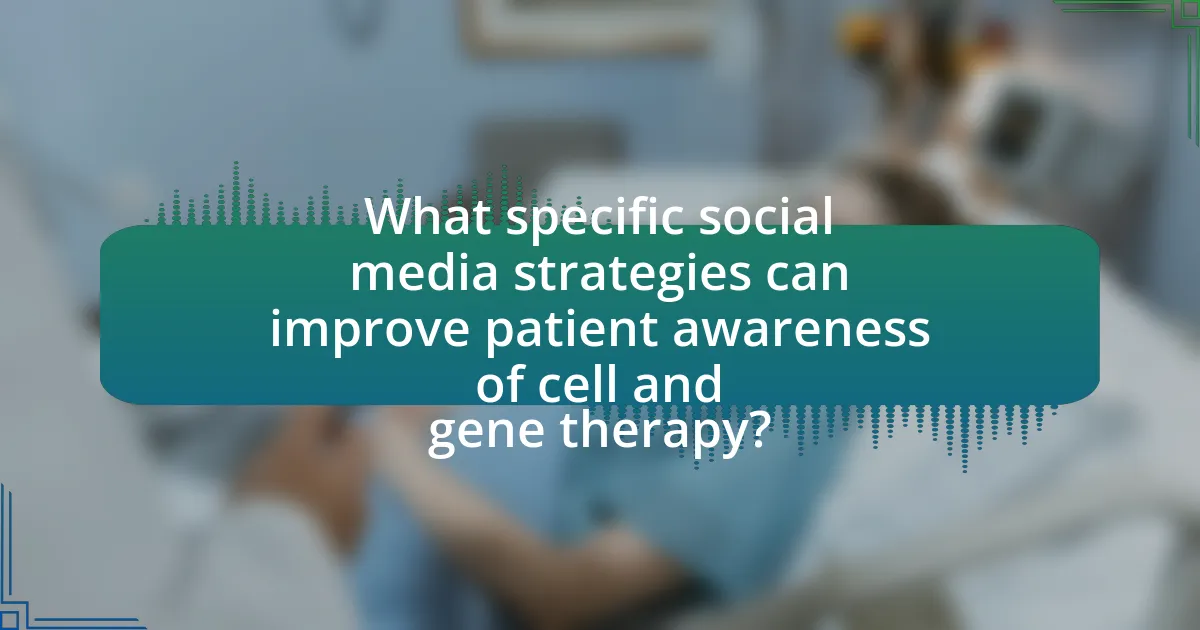
What specific social media strategies can improve patient awareness of cell and gene therapy?
Utilizing targeted social media campaigns can significantly enhance patient awareness of cell and gene therapy. These campaigns should focus on educational content that demystifies the therapies, using infographics, videos, and patient testimonials to convey complex information in an accessible manner. Research indicates that visual content is 40 times more likely to be shared on social media, which can amplify reach and engagement (Source: BuzzSumo, 2018). Additionally, leveraging platforms like Facebook and Instagram for live Q&A sessions with healthcare professionals can foster direct interaction, allowing patients to ask questions and receive real-time information. This strategy not only builds trust but also encourages community engagement, as patients often seek peer support and shared experiences. Furthermore, collaborating with influencers in the healthcare space can help to reach broader audiences, as these individuals often have established credibility and can effectively communicate the benefits of cell and gene therapy.
How can targeted campaigns on social media platforms increase awareness?
Targeted campaigns on social media platforms can increase awareness by delivering tailored content to specific demographics, thereby enhancing engagement and information retention. These campaigns utilize algorithms to identify and reach audiences most likely to be interested in cell and gene therapy, ensuring that relevant information is presented to those who need it most. For instance, a study by the Pew Research Center found that 69% of adults in the U.S. use social media, making it an effective channel for disseminating health-related information. By focusing on user interests and behaviors, targeted campaigns can significantly improve the visibility of cell and gene therapy advancements, leading to higher levels of public awareness and understanding.
What types of content resonate most with patients regarding cell and gene therapy?
Educational content, particularly patient testimonials and success stories, resonates most with patients regarding cell and gene therapy. Research indicates that patients are more likely to engage with content that provides relatable experiences and clear explanations of treatment processes. For instance, a study published in the journal “Nature Reviews Drug Discovery” highlights that 70% of patients prefer stories that illustrate real-life outcomes and personal journeys related to therapies. This type of content not only informs but also builds trust and emotional connection, making it more impactful for patients seeking information on cell and gene therapy.
How can patient testimonials be effectively utilized in social media campaigns?
Patient testimonials can be effectively utilized in social media campaigns by showcasing authentic experiences that resonate with potential patients. These testimonials serve as powerful social proof, enhancing credibility and trust in cell and gene therapy treatments. Research indicates that 79% of consumers trust online reviews as much as personal recommendations, highlighting the importance of genuine patient stories in influencing healthcare decisions. By strategically sharing these testimonials through engaging formats such as videos, quotes, and infographics, campaigns can increase visibility and foster community engagement, ultimately driving awareness and interest in cell and gene therapies.
What role do influencers play in shaping patient awareness of cell and gene therapy?
Influencers play a significant role in shaping patient awareness of cell and gene therapy by leveraging their platforms to disseminate information and personal experiences related to these treatments. They often share educational content, testimonials, and updates on advancements in cell and gene therapy, which can enhance understanding and reduce stigma associated with these medical options. Research indicates that social media influencers can effectively reach diverse audiences, making complex medical information more accessible and relatable. For instance, a study published in the journal “Health Communication” found that health-related social media content shared by influencers can lead to increased patient engagement and awareness, ultimately influencing treatment decisions.
How can healthcare influencers contribute to accurate information dissemination?
Healthcare influencers can contribute to accurate information dissemination by leveraging their platforms to share evidence-based content and engage with their audience. They can utilize their expertise to clarify complex medical concepts, thereby enhancing public understanding of cell and gene therapy. For instance, studies show that social media posts from credible healthcare professionals can significantly increase patient awareness and knowledge about treatment options, as evidenced by a 2021 survey published in the Journal of Medical Internet Research, which found that 70% of respondents trusted information shared by healthcare influencers over traditional media sources. This trust facilitates the spread of accurate information, countering misinformation prevalent in online spaces.
What are the potential risks of relying on influencers for medical information?
Relying on influencers for medical information poses significant risks, including the dissemination of inaccurate or misleading health advice. Influencers often lack formal medical training, which can lead to the promotion of unverified treatments or therapies. For instance, a study published in the Journal of Medical Internet Research found that 30% of health-related posts by influencers contained misinformation. This misinformation can result in patients making uninformed health decisions, potentially jeopardizing their well-being. Additionally, influencers may prioritize engagement over accuracy, further exacerbating the spread of false information.
How can social media analytics be used to measure the impact on patient awareness?
Social media analytics can be used to measure the impact on patient awareness by tracking engagement metrics such as likes, shares, comments, and reach of posts related to cell and gene therapy. These metrics provide quantitative data that reflects how many individuals are interacting with content, indicating the level of awareness and interest generated. For instance, a study published in the Journal of Medical Internet Research found that posts with educational content about cell and gene therapy significantly increased user engagement, suggesting a direct correlation between social media activity and patient awareness. By analyzing these interactions over time, healthcare organizations can assess changes in patient awareness and adapt their communication strategies accordingly.
What metrics are most relevant for assessing patient engagement with cell and gene therapy content?
The most relevant metrics for assessing patient engagement with cell and gene therapy content include website traffic, social media interactions, content shares, and patient feedback. Website traffic indicates the number of visitors accessing the content, reflecting interest levels. Social media interactions, such as likes, comments, and shares, demonstrate how well the content resonates with patients and encourages discussion. Content shares amplify reach and indicate trust in the information provided. Patient feedback, gathered through surveys or comments, offers direct insights into the effectiveness and clarity of the content. These metrics collectively provide a comprehensive view of patient engagement and awareness regarding cell and gene therapy.
How can feedback from social media interactions inform future awareness strategies?
Feedback from social media interactions can inform future awareness strategies by providing insights into patient concerns, preferences, and engagement levels. Analyzing comments, shares, and reactions allows organizations to identify key topics that resonate with patients, enabling them to tailor their messaging effectively. For instance, a study by the Pew Research Center found that 69% of adults use social media, making it a vital platform for understanding public sentiment. By leveraging this data, organizations can refine their outreach efforts, ensuring that they address the most pressing issues and enhance patient education regarding cell and gene therapy.
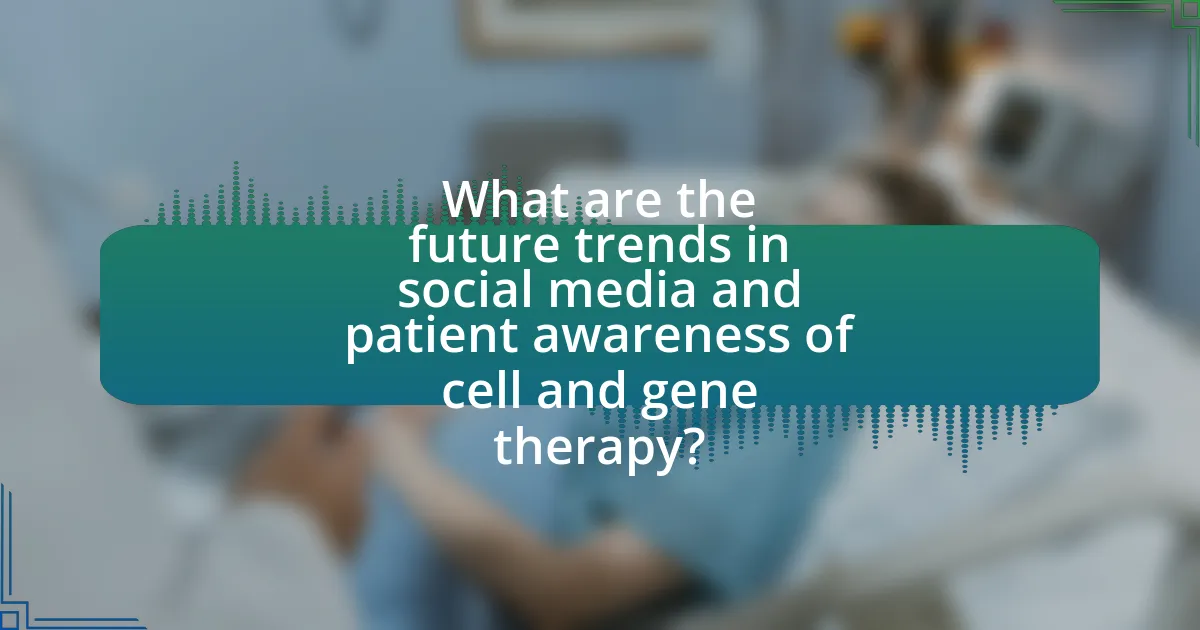
What are the future trends in social media and patient awareness of cell and gene therapy?
Future trends in social media and patient awareness of cell and gene therapy include increased engagement through targeted content, the rise of patient advocacy groups utilizing social platforms, and the integration of telehealth services. Social media platforms are evolving to provide personalized information, which enhances patient understanding and access to cell and gene therapies. For instance, a study by the Journal of Medical Internet Research found that 70% of patients reported using social media to seek health information, indicating a growing reliance on these platforms for education. Additionally, the use of influencers and testimonials on social media is expected to amplify awareness and acceptance of these therapies, as evidenced by the increasing number of campaigns launched by biotech companies to educate patients.
How is the landscape of social media evolving in relation to healthcare communication?
The landscape of social media is evolving significantly in relation to healthcare communication by facilitating direct interactions between patients and healthcare providers, enhancing information dissemination, and fostering community support. Social media platforms enable healthcare professionals to share timely updates, research findings, and treatment options, which increases patient awareness and engagement. For instance, a study published in the Journal of Medical Internet Research found that 80% of patients use social media to seek health information, demonstrating its growing role in healthcare communication. Additionally, platforms like Twitter and Facebook are increasingly used for public health campaigns, allowing for rapid outreach and education on topics such as cell and gene therapy, thereby improving patient understanding and access to innovative treatments.
What emerging technologies could enhance patient engagement with cell and gene therapy information?
Emerging technologies that could enhance patient engagement with cell and gene therapy information include mobile health applications, telemedicine platforms, and artificial intelligence-driven chatbots. Mobile health applications provide patients with personalized information and resources, enabling them to track their treatment progress and access educational materials. Telemedicine platforms facilitate real-time consultations with healthcare providers, allowing patients to ask questions and receive guidance on their therapies. Artificial intelligence-driven chatbots can offer instant responses to patient inquiries, ensuring that individuals receive accurate information about cell and gene therapies at any time. These technologies collectively improve accessibility and understanding, fostering a more informed patient population.
How might regulatory changes impact social media use in healthcare awareness campaigns?
Regulatory changes can significantly impact social media use in healthcare awareness campaigns by imposing stricter guidelines on content, advertising, and patient privacy. For instance, regulations such as the Health Insurance Portability and Accountability Act (HIPAA) in the United States restrict the sharing of personal health information, which can limit the types of patient stories and testimonials that can be shared on social media platforms. Additionally, changes in advertising regulations may require healthcare organizations to provide more disclaimers or evidence-based information, potentially altering the way campaigns are designed and executed. These regulatory frameworks aim to protect patients but can also constrain the creativity and reach of social media campaigns, ultimately affecting their effectiveness in raising awareness about cell and gene therapy.
What best practices should be followed for effective social media communication about cell and gene therapy?
Effective social media communication about cell and gene therapy should prioritize clear, accurate, and engaging content. This involves using straightforward language to explain complex concepts, ensuring that information is scientifically validated and sourced from reputable studies, such as those published in peer-reviewed journals. Additionally, incorporating visuals like infographics can enhance understanding and retention of information. Engaging with the audience through interactive content, such as Q&A sessions or live discussions, fosters community and trust. Regular updates on advancements in cell and gene therapy can keep the audience informed and interested, while addressing misconceptions promptly helps maintain credibility.
How can healthcare organizations ensure the accuracy of information shared on social media?
Healthcare organizations can ensure the accuracy of information shared on social media by implementing a rigorous content review process that includes fact-checking and expert validation. This process involves collaborating with medical professionals and communication specialists to verify the information before it is posted. For instance, a study published in the Journal of Medical Internet Research found that organizations that employed a systematic review process for social media content significantly reduced the dissemination of misinformation. Additionally, organizations should establish clear guidelines for social media use, ensuring that all posts are based on credible sources and current research, thereby enhancing the reliability of the information shared with patients.
What guidelines should be established for ethical social media engagement in healthcare?
Guidelines for ethical social media engagement in healthcare should include transparency, respect for patient privacy, and accurate information dissemination. Transparency involves clearly identifying the source of information and the credentials of healthcare professionals sharing content. Respect for patient privacy mandates that no identifiable patient information is shared without consent, adhering to regulations such as HIPAA. Accurate information dissemination requires that all shared content is evidence-based, referencing credible sources like peer-reviewed journals or established medical organizations, to prevent the spread of misinformation. These guidelines ensure that social media serves as a reliable platform for patient education and awareness, particularly regarding complex topics like cell and gene therapy.
What practical steps can patients take to enhance their understanding of cell and gene therapy through social media?
Patients can enhance their understanding of cell and gene therapy through social media by actively following reputable organizations, engaging with healthcare professionals, and participating in relevant online communities. Following organizations such as the American Society of Gene & Cell Therapy provides access to accurate information and updates on advancements in the field. Engaging with healthcare professionals on platforms like Twitter or LinkedIn allows patients to ask questions and receive expert insights. Additionally, joining online support groups or forums dedicated to cell and gene therapy fosters discussions with peers who share similar experiences, further enriching their knowledge. These steps leverage the vast resources available on social media to promote informed understanding of complex medical topics.
